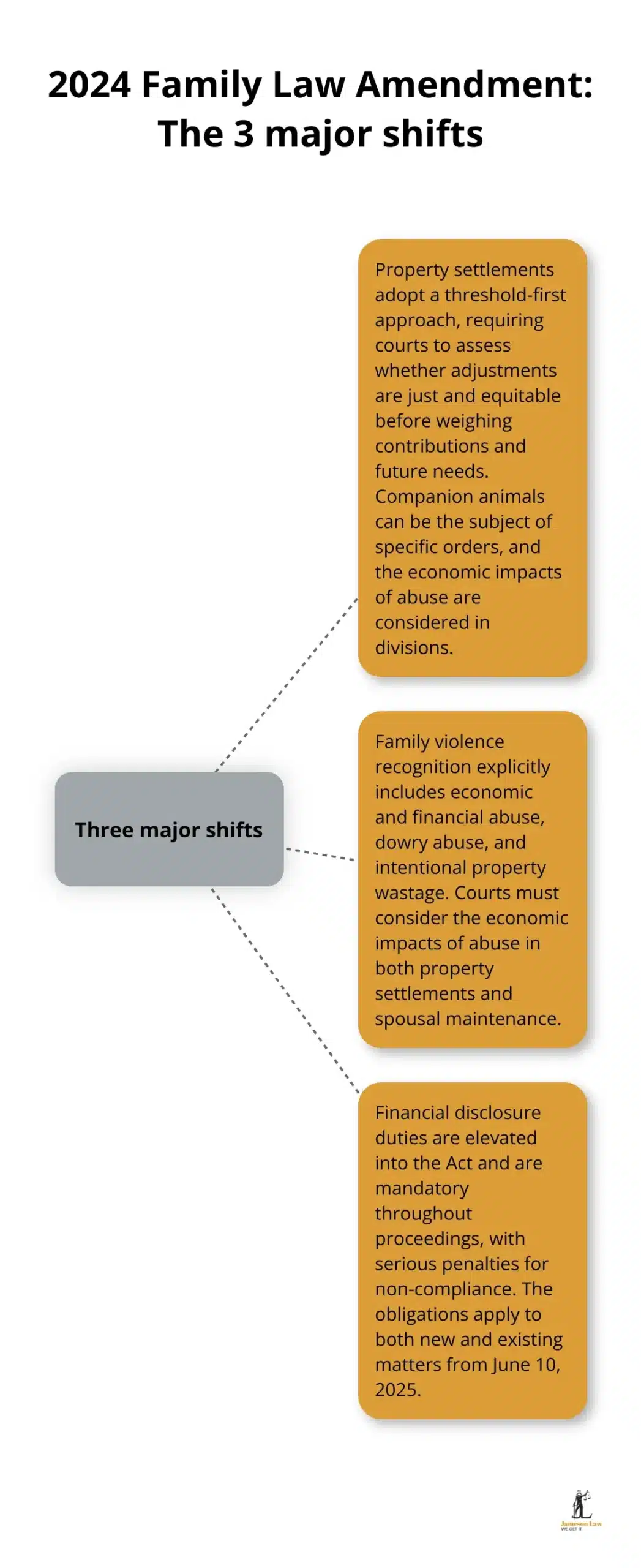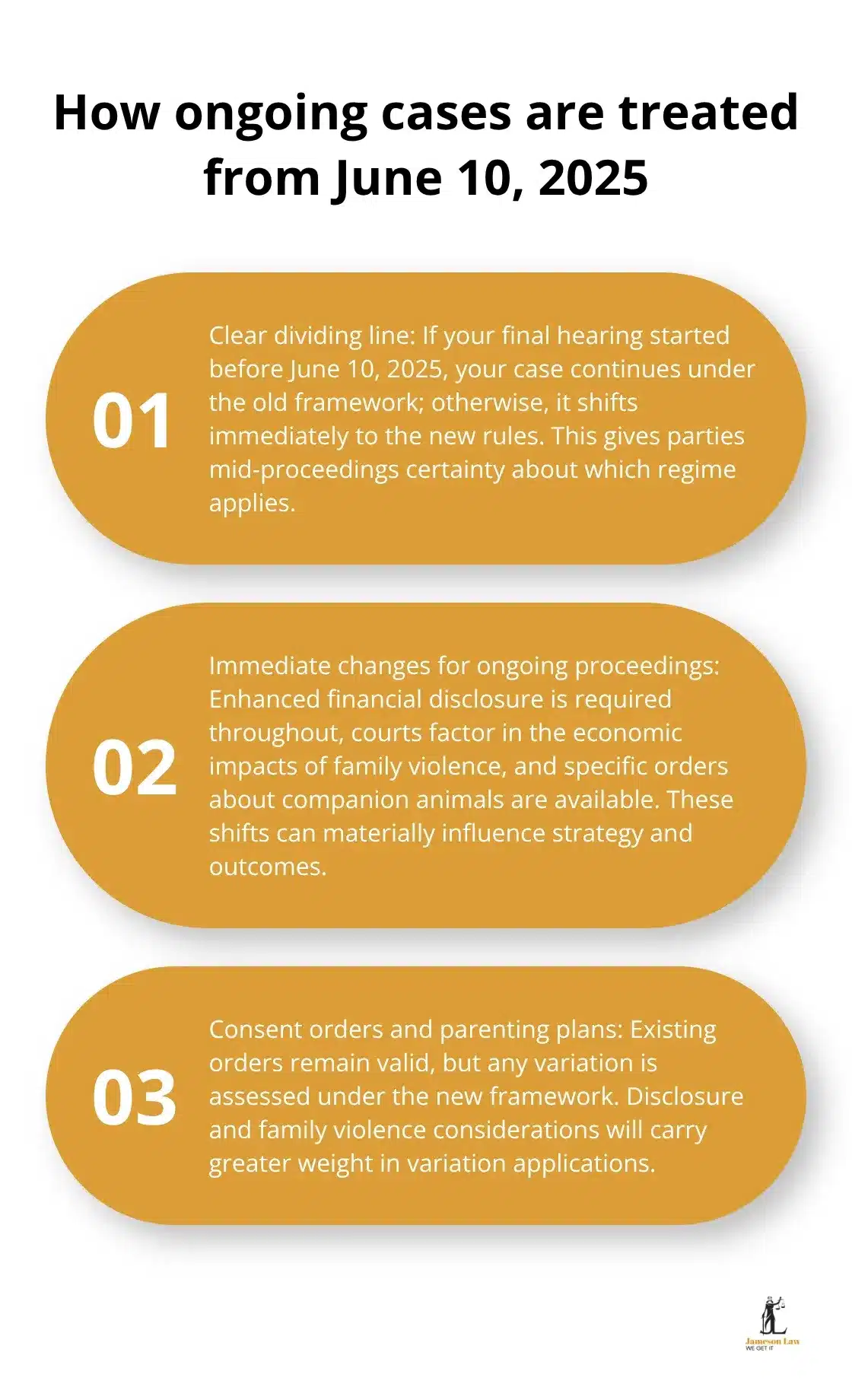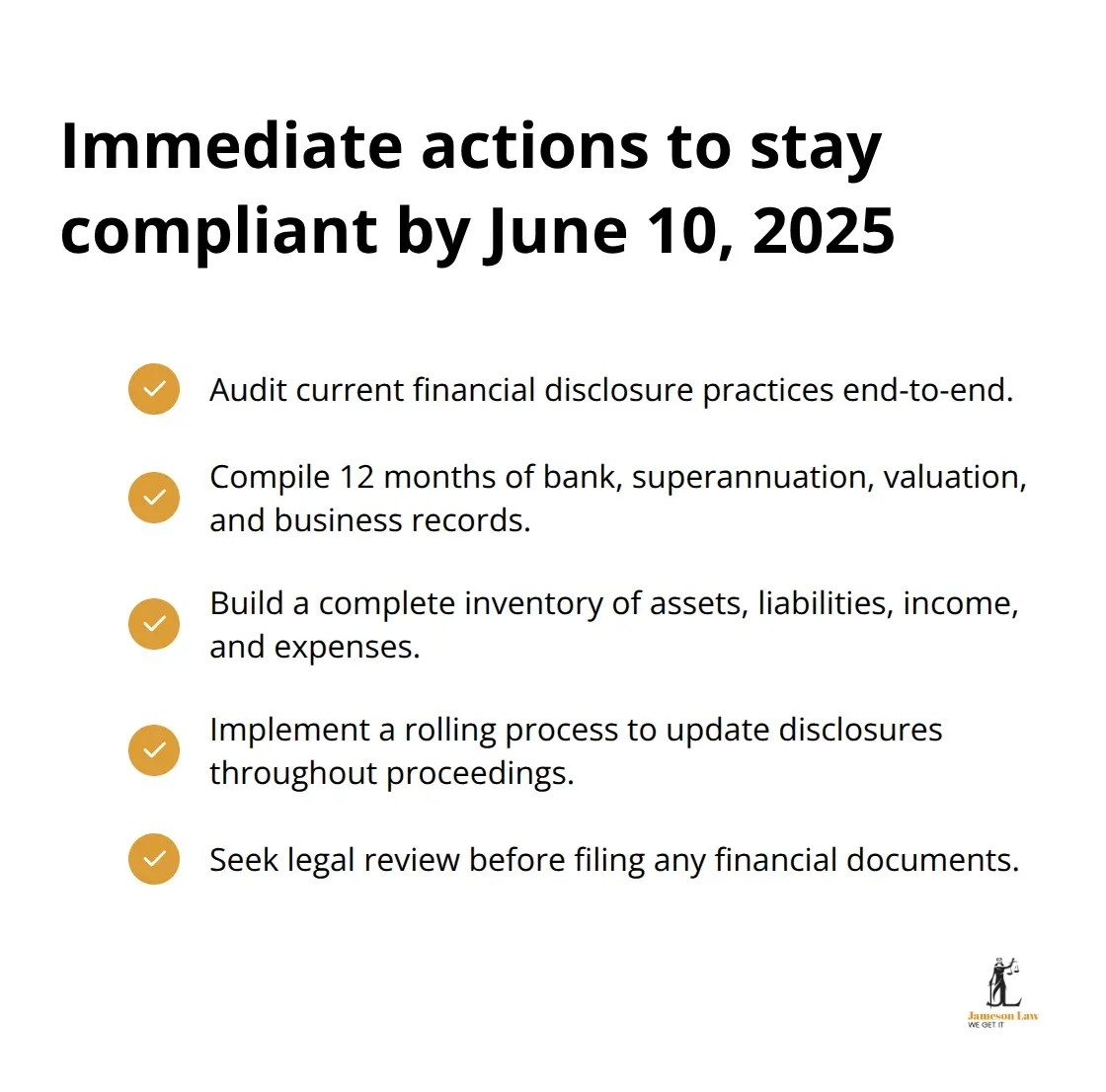Recent Family Law Act amendments have introduced significant changes that directly impact families across Australia. These updates affect everything from child custody arrangements to property settlements and family violence protections.
We at Jameson Law understand that navigating these legislative changes can feel overwhelming for families already dealing with complex legal matters. This guide breaks down the key amendments and provides practical steps to help you adapt to the new requirements.
What Changes Affect Your Family Law Case Most
The Family Law Amendment Act 2024 introduces three major shifts that fundamentally change how Australian courts handle family disputes. These amendments will impact every separating couple from 10 June 2025, regardless of whether their case involves court proceedings. See the Court’s overview on duty of disclosure and the legislation index at legislation.gov.au.

Property Settlements Adopt New Framework
Property settlements now operate under a restructured system. Courts must first determine if they can adjust property interests in a just and equitable manner before they examine contributions and future circumstances. Family violence allegations are present in many current family law applications, and these cases will now see courts formally consider economic impacts of abuse in property divisions.
Financial disclosure becomes mandatory, with penalties for non-compliance. The Court explains disclosure here: duty of disclosure. Courts can also make specific orders about companion animals, as they treat pets in property disputes more explicitly. This framework applies to all new proceedings and existing cases where final hearings haven’t commenced before 10 June 2025.
Family Violence Recognition Expands Significantly
Economic and financial abuse now receives explicit recognition as family violence under section 4AB of the Family Law Act. This includes dowry abuse and intentional property wastage, which gives courts clearer authority to address financial manipulation in relationships.
The legislation lowers the threshold for proving family violence impacts on financial contributions. This makes it easier to demonstrate how abuse affected earning capacity or asset accumulation. Courts must consider these economic effects when they determine both property settlements and spousal maintenance, which represents a shift from previous approaches that often overlooked financial abuse patterns.
Disclosure Duties Create Stricter Requirements
The new amendments elevate financial disclosure duties into the Act. Parties must now provide all relevant financial information throughout property and financial proceedings. Non-compliance can lead to cost penalties or adverse impacts on settlement outcomes. Filing guidance: how to file and Financial Statement form.
What Happens to Your Current Family Law Case
The 10 June 2025 implementation date creates a clear dividing line for existing family law proceedings. Cases where final hearings have already commenced before this date will continue under the old framework, while all other ongoing proceedings must adapt to the new requirements immediately. This affects ongoing applications that involve family violence allegations, as these cases will now benefit from expanded economic abuse recognition and clearer property settlement guidelines.

Ongoing Court Proceedings Face Immediate Changes
Your existing court case will operate under the new rules from 10 June 2025, unless your final hearing started before this date. Enhanced financial disclosure duties apply immediately to current proceedings. Courts will also consider economic impacts of family violence in property settlements for ongoing cases, which strengthens claims where financial abuse occurred during relationships. The new framework for companion animals also applies to existing cases.
Consent Orders and Parenting Plans Remain Valid
Existing consent orders and parenting plans stay in full effect after 10 June 2025, regardless of when they were made. The amendments do not retrospectively alter finalised agreements or court orders, which provides certainty for families who have already resolved their disputes. However, any applications to vary or set aside existing consent orders will be assessed under the new legislative framework (particularly regarding financial disclosure obligations and family violence considerations).
New Disclosure Requirements Apply Immediately
Courts now require parties in ongoing proceedings to meet stricter financial transparency standards from 10 June 2025. This creates immediate obligations for separating couples who must provide all relevant financial information throughout their case, not just at specific milestones. Non-compliance can result in costs orders or adverse impacts on property settlement outcomes.
What Should You Do Right Now
Families with existing matters should conduct an immediate audit of their financial disclosure practices. The enhanced transparency requirements demand comprehensive documentation of all assets, liabilities, and income streams throughout proceedings. Start by collecting bank statements, superannuation records, property valuations, and business financial reports from the past 12 months. See Services Australia resources for families: separated parents.

Create a complete inventory of all financial information. Courts can impose penalties for incomplete disclosure. Guidance on forms and process: Financial Statement and duty of disclosure.
Document All Evidence of Financial Abuse
Economic abuse claims now carry significant weight in property settlements, which makes detailed documentation essential. Record instances of financial control, hidden assets, unauthorised spending, or interference with employment. Courts specifically consider dowry abuse and intentional property wastage as relevant factors. If you need tailored advice, speak with our domestic violence and protection team.
Schedule Professional Legal Assessment Within 30 Days
The complexity of these amendments makes professional legal advice crucial for families with active cases or recent separations. Book a confidential consult with Jameson Law’s family law team to understand how the new disclosure duties affect your situation and identify opportunities under the expanded family violence provisions in property settlements. Call (02) 8806 0866 or contact us.
Review Your Current Financial Documentation
Examine your financial records to identify gaps. The framework requires parties to provide relevant financial information throughout proceedings rather than at specific stages. Maintain current records of income, expenses, assets, and liabilities at all times. For broader context, see the Attorney-General’s summary of family law reforms.
Final Thoughts
The Family Law Act amendments represent major changes to Australian family law. From 10 June 2025, every separating couple will face a transformed legal landscape where economic abuse receives explicit recognition, financial disclosure becomes mandatory, and property settlements operate under a restructured framework. These changes affect current court proceedings and create new obligations for families already in the legal system.
Professional legal guidance becomes essential when you face these legislative changes. We at Jameson Law understand how these amendments affect your circumstances and can develop strategies to protect your interests under the new framework. For help today, call (02) 8806 0866 or contact us.













